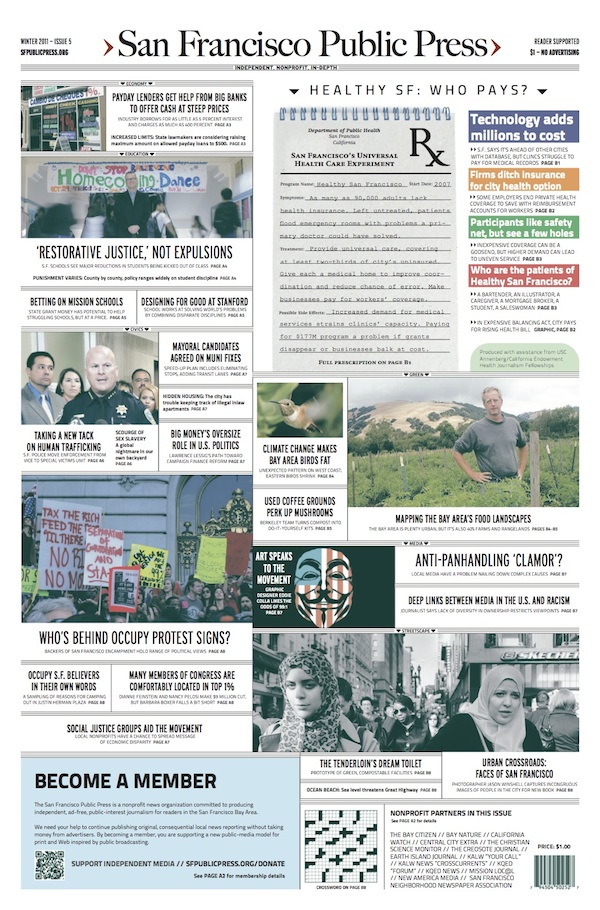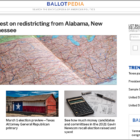In the Public Press, elites don’t dictate coverage
If you missed it, the Winter 2011 edition of the Public Press (Issue 5) went on sale in November, and it came on the heels of a national conversation about how to fund and fortify community journalism. This is the editorial on page 2. Though we have hit many journalistic and community milestones this year, the Public Press still needs your help. It remains a grassroots, volunteer-run organization that parcels out donations carefully to pay rent on a compact downtown newsroom, to print the paper and pay freelance fees to writers from what’s left over. If you haven’t already done so, please consider making a year-end donation to the Public Press to sustain our work and help us grow.
* * *
Behold Issue 5 of the San Francisco Public Press, an ad-free nonprofit local newspaper that models itself on, among other things, public broadcasting. We also takes cues from noncommercial magazines, some of which have become influential of late and have a unique perspective on the news.
Our approach has always been to look for stories that see the city and the Bay Area from the viewpoint of average people instead of just the elites, whose concerns are well represented. We don’t practice advocacy journalism. We do strive to cover, in depth, stories and communities that commercially funded media don’t often pay attention to.
The biggest story Bay Area news media could not ignore in recent months is the “Occupy X” movement — X being whatever, wherever or whoever comes into the crosshairs of a nebulous but grassroots throng of activists, unemployed professionals and anyone who feels politics and business are corrupt these days.
Less known is the spark behind the movement. Occupy Wall Street began in New York Sept. 17, when Adbusters, a “culturejammer” ad-free magazine that scrutinizes the advertising industry, called for a show of support for the victims of the financial industry meltdown that took the entire economy with it. Within weeks, the movement spread across the country and around the world — most dramatically in Oakland, where police appear to have overreacted to a long-term protest in which a minority practiced civil disobedience.
Adbusters found its voice in an era of corporate ascendance. Its consistent message, remixed and reinterpreted endlessly in college communications and media studies programs everywhere, is that the media most people consume is imbued with the values of the business interests that pay for the ads.
When it was launched on the Web in 2009, the Public Press similarly sought editorial independence of a form missing from the mainstream. More than a year after our premiere print edition hit the streets in June 2010, we remain committed to the idea of noncommercial journalism, a model that mixes a modestly priced, ad-free print edition with small donations from members, support from foundations and article syndication.
Our special report on the Healthy San Francisco program, funded by the USC Annenberg/California Endowment Health Journalism Fellowships, investigates a huge local story that’s received scant journalistic coverage, but affects the lives of tens of thousands of working and unemployed city residents. Readers also pitched in for the project with online microdonations via Spot.Us.
Our story on “payday” loans by reporter Rick Jurgens questions why some of the biggest banks, including San Francisco-based Wells Fargo, have invested in an industry that offers short-term loans to low-income people at interest once considered usurious by the state of California.
And, of course, we take a deep dive into the Occupiers in Oakland, San Francisco and beyond, focusing mostly on the ideals and ideas for change that participants bring to the vibrant but amorphous picket lines.
While all of our more than two-dozen nonprofit news and civic affairs partners are “public media,” not all of them eschew ads. From our perspective, there has to be a diversity of business models in an industry that is vital to the commonweal but whose economic foundation has been rocked by changes in technology and corporate ownership. The Public Press is run by volunteers and modestly paid freelance writers who believe the news is too important to leave solely in the hands of Wall Street.










